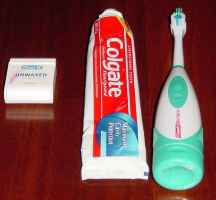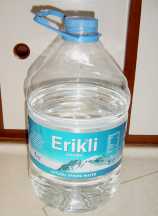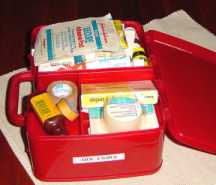|
Journal
Contact Us
Poems
Site Map
Search
| |
Cruising is, inherently, a
very healthy lifestyle. Without a car we are forced to walk
everywhere which provides lots of good exercise. Contrary to
what most people think, passages do not provide much of a work out,
unless, of course, there is bad weather. Although the motion at sea provides good isometric
exercise.
[Health
practices onboard] [Tropical
Health Care] [Foreign
Medical Care] [Medical Care
Onboard]
The following are
some of the things we do to insure good health while at sea and in
remote places.
| Hygiene -
Good hygiene is the first line of defense in staying
well. Here are some of the things we do.
 |
- Wash Hands - The primary
thing that we do to insure good health is very
simple and easy to do. We always wash our
hands with soap before eating and, of course, after
using the toilet. As cook, Judi always
thoroughly washes her hands before any food
preparation.
If we are traveling or eating out and there is no water easily
available, such as on a plane, we use the
waterless hand cleaners. We seldom get
colds, flu, diarrhea or other illness following this
practice.
- Avoid Mold and Mildew
- In cold climates, mold and mildew are real
problems inside the boat. Judi washes the
headliner and other surfaces with a weak
mixture of bleach and water. If you are
worried about putting bleach on something, you can
use vinegar and water
- Dental hygiene - Good
dental care is very important in order to avoid
dental problems at sea or in remote locations.
We both use battery-powered toothbrushes and
find that our dental problems have been
significantly reduced. We also try to make
frequent use of
dental floss to insure healthy gums.
We strive to get our teeth cleaned every 6 months,
if possible, but at the very least once a year.
There is good dental care in most places we have
stayed for a significant length of time. See
List below under Medical Care in Foreign Ports.
If you are a Diver and need a new filling or
to have one replaced, please tell the dentist that
you are diver and that it must be secure with no air
gaps between filling and tooth or gum. Else
when you do dive, the pressure difference may
dislodge the filling.
|
| Nutrition
- Good nutrition can be a
problem, especially on long passages, due to the lack of
fresh fruits and vegetables. Here is what we do.
 |
- Dietary supplements
- Multivitamin tablets
with minerals* - 1 daily
- Calcium with Magnesium
tablets (for Judi) - 2 daily
- Chewable Vitamin C
tablets (1000 mg) which we take if we feel a
cold or sore throat coming on.
- Fresh local fruits and
vegetables from local markets such as mango,
papaya and in S.E. Asia, fabulous rambutans and
mangosteens.
- Salads - now that we are
in the Mediterranean there are lots of fresh
ingredients available to make a wonderful salad with
feta cheese, olives, tomatoes. Especially good
when the temps are 95+ and you really don't want to
cook.
*Note: It is
important to take a multivitamin with minerals,
especially if you are relying on water supplied with a
watermaker as this water contains no minerals. |
| Water - In many places in the world the water is not potable
and you must rely either on bottled water or water from
the water maker. (see *Note above)  |
- Potable Water - We usually
add bleach to the water when filling our water
tanks.
- 'Suspect' or bad tasting Water
- In many cases (Turkey) the water is potable, but
does not taste especially good, so we drink bottled
water and use the water for cooking and coffee only.
- Non potable water - we do
not fill our water tanks with non potable water.
In Thailand, we could get 20 liter containers of
water for about 20 baht which we used to fill our
tanks. A real nuisance, but the water was good
and inexpensive.
- Watermaker water - If we
are in a clean anchorage, we "top up" our water
tanks using our watermaker. But, since ours is a
low output watermaker, we don't do this all the
time.
- Rainwater - Our sun awning
can be used to catch rainwater and we have often
filled our tanks this way. If it hasn't rained
for awhile, let the rainwater wash off the awning or
decks before diverting it into your tanks.
|
| Wash
Fruits and Vegetables -
It is
very important, especially in developing countries, to
thoroughly wash fruits and vegetables. In many
places, the farmers may use toxic pesticides on crops or
animal or even human waste as fertilizer. Here's
what we do with certain fruits and vegetables |
- Bananas - if you buy a
'hand' of bananas or even a small bunch, it is good
idea to dunk them in seawater on the way back to the
boat to get rid all of the 'critters' that may
be hidden in them before they get onboard your boat.
- Lettuce/Cabbage- Judi
always peels off whatever is required and lets it
soak for about 5-10 minutes in a mixture or water
and bleach (approx. 1/2 tsp. bleach to 4 cups of
water) before using. Rinse in potable water
and towel dry with paper or cloth towels.
- Apples, Tomatoes, etc. -
Wash thoroughly with a little soap
and water.
- Carrots, cucumbers,
green peppers, etc. - Rinse well and then peel
before eating unless they are to be cooked and you
like the skin (we don't).
- Broccoli, Cauliflower, -
same as for lettuce, if to be eaten raw, otherwise
just rinse and cook.
|
Eating
out in foreign ports - We are always keen to try the
local cuisines and look forward to eating out.
Here are some simple, commonsense practices we do to
insure that we do not get 'traveler's tummy'
If confident that the food and water is
good, then plunge in and enjoy.
Thailand is a 'foodies'
paradise, but you must like spicy food. In
Phuket especially, the food was good, always fresh,
inexpensive and safe to eat. The water served was
always bottled water. |
If we are unsure about
the quality of food or drink in a place, we always:
- Eat hot,
freshly prepared foods only. When
we were traveling through China, we often
could not communicate well, so we ate, rice, tomato and
egg, stir-fried together in a wok. We were
able to point to the ingredients and use sign
language to make ourselves understood.
- Avoid
stews and buffet meals that have been
sitting around for a while. This is often the
case when traveling by bus when the bus stops for
lunch or dinner. In that case, try to carry
some snack foods, or buy some fruit that can be
peeled to eat.
- Avoid
salads and lettuce, tomato, etc. on
sandwiches
- Drink bottled
water even for brushing
your teeth
- Drink cold drinks
without ice or better yet,
have them open the can or bottle in front of you.
- Avoid
undercooked eggs - If you order fried,
soft-boiled or scrambled eggs or omelets, be sure
that they are well cooked, as they are prime
carriers of salmonella bacteria.
We NEVER eat out the
night before a long passage, in order to preclude a bout
of food poisoning, or food allergy problems at sea.
|
|
Dehydration
-
I
cannot stress enough how important it is to stay
hydrated in the tropics. We carry a bottle of
water with us at all times. |
Drink at least
1
quart (liter) of water
(other fluids do not count) per day.
For a long time, both of us
complained of low back pain which we found was caused by lack of water.
The pain was a result of acid buildup in our
kidneys. Once we started drinking lots of
water, we had no more pain. So before you
think you have back problems, start drinking water. |
|
Mosquito precautions
-
In malaria infested areas, we took the following
precautions. |
- Screens on all hatches
and companionway
- Stay onboard boat away
from shore in the morning and evening when the
malaria mosquitoes are active
- Wear long-sleeved shirts
and trousers on land
- Use mosquito repellant with
at least 80% DeetsTM
ingredient
In Vanuatu, Bob took malaria
medicine (larium) while Judi did not - both of us
followed the above precautions and neither of us
contracted Malaria
|
|
Cuts and Abrasions
-
In the tropics these wounds are
very difficult to heal and can become easily
infected. |
Wash well with clean water
to remove any sand and coral, swab with betadine or
other antiseptic and lightly cover with bandage and
keep dry.
If wound starts to 'weep' then remove bandage and
expose to air. You should dress the wound
daily with antiseptic. I also used a product
that I found in Australia called MediHoneyTM,
which is an antibacterial honey. If it does
not show signs of healing after about 5 days, then
seek medical attention.
|
|
Sandfly (no, nos) bites
- |
Calamine lotion
provides some relief for the itching.
|
|
Jelly
fish stings - |
Vinegar
lessens the pain.
|
|
Sun Protection
- The damage done to
your health by the sun cannot be overstated. This
is what we do to try to avoid problems. |
-
COVER UP! - Stay out of the sun
under cover whenever possible
- Use sunscreen with 45 SPF
protection
- Wear wide-brimmed hat,
especially important for men
or
- Hat with flap that covers
neck and ears.
- Wear long-sleeved
shirts
Bob has very light complexion and
is especially susceptible to the sun. He has
had pieces of himself removed in almost every major
port we have been as a result of sun damage done
when he was a child. Lately the pieces removed
have been basel-cell skin cancers, which, although
very slow growing, are worrisome nonetheless.
In Singapore, he had to have costly plastic
surgery performed on his ear, due to a large
area that had to be removed. |
| Doctors &
Dermatologists |
We have had mostly good
care by doctors in all places we have been, especially
New Zealand, Australia, Singapore and Thailand.
All doctors spoke English. Even in the remote
Marquesas, we were given medicine for Elephantitis
(which is a problem there) free of charge at the clinic
on Nuka Hiva. To see specifics, see
Medical heading under appropriate
Destination page. |
| Dentists
- |
As stated above, we try
to see a Dentist at least once a year. This is
usually done when we are staying somewhere waiting out
the cyclone season, or wintering. Again,
we have good dental care in all of these places.
For specific, look on the appropriate
Destination page |
Hospitals
and Clinics
-
Here is a list of some good
hospitals and clinics that we have used in our travels.
I stress that this is just a list of
places we have personally used and gotten good care. |
- Auckland, NZ - see
Medical
under Auckland City Destination
- Brisbane, Australia - see
Medical
under Brisbane City Destination
and also Scarbough
Medical page
- Bangkok Phuket Hospital,
Phuket, Thailand - For about $100 US, you can get a
complete physical, including dental x-rays and exam,
heart stress test, bone density test and chest
x-ray. The hospital is very modern and the
doctors and staff all speak English.
- Singapore - see
Medical
under Singapore City Destination page.
- El Gouna Resort Clinic
Hurghada, Egypt- Reasonably good medical care
|
| Books
- |
- Merck Manual
- Where There Is No Doctor
- The USP Guide to Medicines (OK
guide but often does not include medicines used in
Europe.)
- Ship's Medicine Chest - medical
book used on merchant ships
|
| Software
- |
- Merck Manual diagnostic software
(marginally useful)
|
|
Medical Kit
-
Fairly
comprehensive medical supplies that we have divided into
several kits:

First Aid Kit |
|
Major trauma kit for large
cuts and abrasions |
Large
bandages, thick gauze dressings, steri-strips,
scissors, Kling flexible bandages,
antibiotic cream and betadine swabs |
|
Fractures and Sprains |
Ace
bandages, triangle sling, wooden splints,
adhesive tape. Inflatable casts (1 for
arm & 1 for leg) |
|
Burn kit |
Contains
several different sizes of 2nd SkinTM
moist
burn pads, thick gauze bandage rolls and
adhesive tape.
2nd SkinTM is a product that looks like a
soft pliable plastic patch. It is
impregnated with sterile fluids and keeps
the burn moist and also allows air to get to
the burn for healing. When crossing
the Pacific, Judi received a 2nd degree burn
after being splashed on the stomach with
boiling water. After cleansing with
cool water and Betadine, she placed a 2nd
skin patch over the burn and left it on for
about 1 week. When the patch was
removed, the burn was nearly healed with
new skin growth over the burn. |
|
First Aid Kit |
Kept in small,
easily grabbed plastic (lunchbox-type)
container. Contains band-aids,
antiseptic, antibiotic cream, adhesive tape,
gauze pads. sting-aid pads for bee stings
and mosquito bites.
MedihoneyTM -
Antibacterial Honey manufactured in
Australia. This is one of the best
topical treatment products we have ever come
across for minor cuts, wounds, abrasions and
insect bites. This stuff is terrific
and unrivaled in healing difficult wounds. |
|
Cold Medicines and pain
relievers |
Kept in small
plastic (lunchbox-type) container. We
always carry antihistamines for allergies
and bee stings. |
|
Prescription Medicines |
I
refrigerate these items in the tropics.
We do not carry injectable drugs or needles. |
|
Blood pressure cuff |
Kept in
small waterproof plastic container |
|
|
|